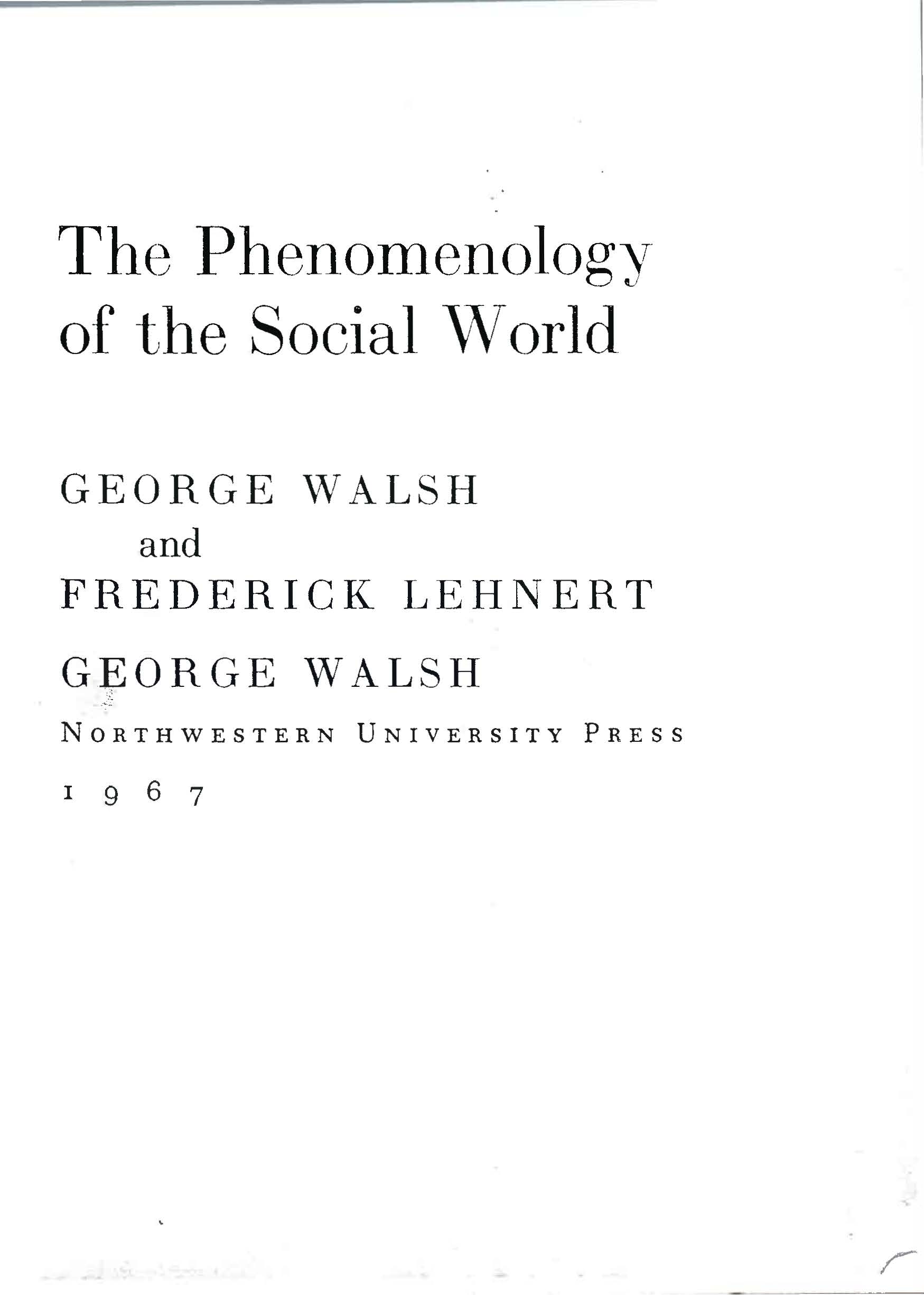 Get A Real Life: Letting Go of Old Ways to Create a New Way of Being in Stressed Times, self-published by the author, Tom Thiss, in 2023. He taught a variety of management lessons and communication skills to the global business community for over thirty years. His previous book, The Wizard of Iz, teaches centering, focusing and accepting no limitations in your personal power. At the backdrop of his new book, Get A Real Life!, is the dislocating effect of shock stress experienced by calamitous events like 9-11, COVID 19 and 3-11 where lives were impacted in an instant. Get A Real Life! is about getting beyond fear and scarcity, about living more abundantly. appreciating the good times and bad times. "The difference is attitude". Tom was intrigued by the vision and philosophy of Mr Agha Hasan Abedi, President and founder of Bank of Credit and Commerce International (BCCI). He joined the bank to communicate Mr Abedi's sense of possibilities and management philosophy throughout the bank.
Get A Real Life: Letting Go of Old Ways to Create a New Way of Being in Stressed Times, self-published by the author, Tom Thiss, in 2023. He taught a variety of management lessons and communication skills to the global business community for over thirty years. His previous book, The Wizard of Iz, teaches centering, focusing and accepting no limitations in your personal power. At the backdrop of his new book, Get A Real Life!, is the dislocating effect of shock stress experienced by calamitous events like 9-11, COVID 19 and 3-11 where lives were impacted in an instant. Get A Real Life! is about getting beyond fear and scarcity, about living more abundantly. appreciating the good times and bad times. "The difference is attitude". Tom was intrigued by the vision and philosophy of Mr Agha Hasan Abedi, President and founder of Bank of Credit and Commerce International (BCCI). He joined the bank to communicate Mr Abedi's sense of possibilities and management philosophy throughout the bank.
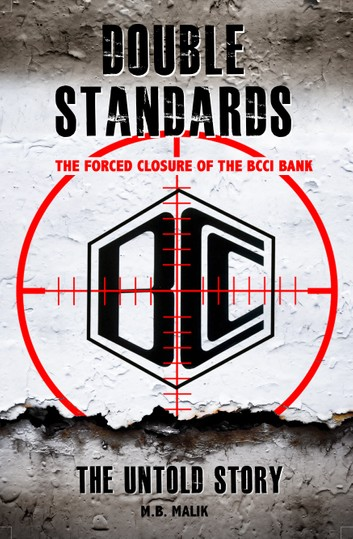 Double Standards: The Forced Closure of the BCCI Bank, published in 2016. The author, MB Malik, explores the events leading up to the forced closure of the Bank of Credit and Commerce International (BCCI) in 1991. Malik argues that the closure was politically motivated and driven by a desire to protect Western financial institutions, highlighting the double standards and hypocrisy of Western regulators and governments in their treatment of BCCI compared to other Western banks that engaged in similar activities. The book provides an in-depth analysis of the history and operations of BCCI and its role in the global financial system, as well as insights into the cultural and ideological differences between Islamic and Western banking. Malik suggests that the closure of BCCI had far-reaching implications for the Muslim world and calls for a more equitable and just global financial system.
Double Standards: The Forced Closure of the BCCI Bank, published in 2016. The author, MB Malik, explores the events leading up to the forced closure of the Bank of Credit and Commerce International (BCCI) in 1991. Malik argues that the closure was politically motivated and driven by a desire to protect Western financial institutions, highlighting the double standards and hypocrisy of Western regulators and governments in their treatment of BCCI compared to other Western banks that engaged in similar activities. The book provides an in-depth analysis of the history and operations of BCCI and its role in the global financial system, as well as insights into the cultural and ideological differences between Islamic and Western banking. Malik suggests that the closure of BCCI had far-reaching implications for the Muslim world and calls for a more equitable and just global financial system.
 The Infiltrator published in 2015. The author, Robert Manzur, a U.S. federal agent, tells the story of his sting operation to implicate Bank of Credit and Commerce International (BCCI) on money laundering charges. He claimed to have first-hand knowledge about how unnamed international banks and business catered to those who owned the then nearly US$2 trillion in criminal proceeds laundered annually. The author does not explain why he did not reveal the name of any of these international banks and why not one of them was shut down by the western central banks.
The Infiltrator published in 2015. The author, Robert Manzur, a U.S. federal agent, tells the story of his sting operation to implicate Bank of Credit and Commerce International (BCCI) on money laundering charges. He claimed to have first-hand knowledge about how unnamed international banks and business catered to those who owned the then nearly US$2 trillion in criminal proceeds laundered annually. The author does not explain why he did not reveal the name of any of these international banks and why not one of them was shut down by the western central banks.
 BEING AND KNOWING A Journey into Politics, self-published in 2012 by Mr John Hillbery. He gave up formal education at an early age with a commitment to educate himself through experience. From a sailor, shipbroker, stockbroker, newspaperman and communicator, he progressed to become Director of Communications in the largest bank of the world, Bank of America of USA, working in the City of London, United Kingdom before he was head hunted by BCCI. John Hillbery joined BCCI in 1979 as an advisor of communications at the bank's central office in London that handled all the head office functions. He saw in BCCI a moral purpose and vision that he shared with the founder President, Mr Agha Hasan Abedi. With sympathy and understanding Mr Hillbery reveals the inside story of BCCI - a bank established as a Luxembourg bank in 1972 to redress the imbalances in the world economy and changing the destiny of third world countries. In 1991 the western central banks abruptly shut down BCCI but some third world countries where BCCI was an important financial institution did not do so. Mr Hillbery's book is also a study of morality and finance that is deeply relevant in modern banking crises.
BEING AND KNOWING A Journey into Politics, self-published in 2012 by Mr John Hillbery. He gave up formal education at an early age with a commitment to educate himself through experience. From a sailor, shipbroker, stockbroker, newspaperman and communicator, he progressed to become Director of Communications in the largest bank of the world, Bank of America of USA, working in the City of London, United Kingdom before he was head hunted by BCCI. John Hillbery joined BCCI in 1979 as an advisor of communications at the bank's central office in London that handled all the head office functions. He saw in BCCI a moral purpose and vision that he shared with the founder President, Mr Agha Hasan Abedi. With sympathy and understanding Mr Hillbery reveals the inside story of BCCI - a bank established as a Luxembourg bank in 1972 to redress the imbalances in the world economy and changing the destiny of third world countries. In 1991 the western central banks abruptly shut down BCCI but some third world countries where BCCI was an important financial institution did not do so. Mr Hillbery's book is also a study of morality and finance that is deeply relevant in modern banking crises.
 TREASURE I$LANDS: Tax Havens and the Men Who Stole the World published in 2012. According to Nicholas Shaxson, the author, a Fellow of the Royal Institute of International Affairs (Chatham House) London and an experienced journalist, tax havens are no longer just about small offshore islands. "Nobody disagrees that Britain sits, spider-like, at the centre of a vast International web of tax havens, hoovering up trillions of dollars' worth of business and capital from around the globe and fuelling it up to the City of London ... Nobody denies now that the United States is a gigantic tax haven". The author incorrectly refers to BCCI's vast global presence as entirely offshore operations.
TREASURE I$LANDS: Tax Havens and the Men Who Stole the World published in 2012. According to Nicholas Shaxson, the author, a Fellow of the Royal Institute of International Affairs (Chatham House) London and an experienced journalist, tax havens are no longer just about small offshore islands. "Nobody disagrees that Britain sits, spider-like, at the centre of a vast International web of tax havens, hoovering up trillions of dollars' worth of business and capital from around the globe and fuelling it up to the City of London ... Nobody denies now that the United States is a gigantic tax haven". The author incorrectly refers to BCCI's vast global presence as entirely offshore operations.
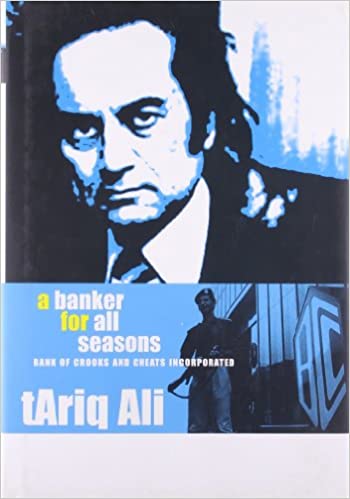 Banker for All Seasons published in 2007. Tariq Ali, the author, a Pakistani-British political activist, writer and journalist, attempts to present an account of the rise and fall of the Bank of Credit and Commerce International is riddled with factual errors and many unsubstantiated allegations drawn from various third-party sources. As a leading voice on the Left since the 1960s he has been a controversial figure and reportedly a man with contradictory identities. At one time he criticised Mother Theresa, 1979 Nobel Peace Prize winner for her charitable work, referring to her as " a charlatan, pure and simple" in a documentary film produced by him and Christopher Hitchens called ‘Hell’s Angels’ aired on 8 November 1994 on UK TV Channel 4. On 26 August 2020 he posted on Twitter that "Mother Teresa was the truest epitome of strength, selflessness and unconditional love, whose tireless humanitarian service has served as an inspiration for many".
Banker for All Seasons published in 2007. Tariq Ali, the author, a Pakistani-British political activist, writer and journalist, attempts to present an account of the rise and fall of the Bank of Credit and Commerce International is riddled with factual errors and many unsubstantiated allegations drawn from various third-party sources. As a leading voice on the Left since the 1960s he has been a controversial figure and reportedly a man with contradictory identities. At one time he criticised Mother Theresa, 1979 Nobel Peace Prize winner for her charitable work, referring to her as " a charlatan, pure and simple" in a documentary film produced by him and Christopher Hitchens called ‘Hell’s Angels’ aired on 8 November 1994 on UK TV Channel 4. On 26 August 2020 he posted on Twitter that "Mother Teresa was the truest epitome of strength, selflessness and unconditional love, whose tireless humanitarian service has served as an inspiration for many".
.jpg) A Game As Old As Empire published in 2007. The book edited by Mr Steve Hiatt who worked for Apple, Netscape, Progressive Asset Management, Standford Research Institute, became known as SRI International in 1977 carrying out client-sponsored research and development for government agencies, commercial businesses, and private foundations, provides an account of economic hit men and journalists into the pervasive web of systematic corruption. In the first chapter titled Global Empire: The Web of Control by Mr Hiatt, he discusses why it is so hard for Third World Countries to escape an unjust system, with the countries of the Global South subsidising the wealthy North and outlines the web of control that maintains this control - financial, political and military. In chapter four titled BCCI's Double Game: Banking on America, Banking on Jihad by Ms Lucy Komisar, she make sensation claims that Bank of Commerce International (BCCI) was a tool used by many powerful clients, ranging from the CIA and the Medellin drug cartel to Osama bin Laden, al-Qaida and influential figures in both the Republican and Democratic parties in the USA. She also makes an unsubstantiated statement that when BCCI was finally shut down, as much as US$15 billion had been lost or stolen - the biggest bank fraud in world history. Ms Komisar, a New York city-based investigative journalist in the USA, does not appear to have conducted any independent research and simply relied on various sources listed at the end of this chapter.
A Game As Old As Empire published in 2007. The book edited by Mr Steve Hiatt who worked for Apple, Netscape, Progressive Asset Management, Standford Research Institute, became known as SRI International in 1977 carrying out client-sponsored research and development for government agencies, commercial businesses, and private foundations, provides an account of economic hit men and journalists into the pervasive web of systematic corruption. In the first chapter titled Global Empire: The Web of Control by Mr Hiatt, he discusses why it is so hard for Third World Countries to escape an unjust system, with the countries of the Global South subsidising the wealthy North and outlines the web of control that maintains this control - financial, political and military. In chapter four titled BCCI's Double Game: Banking on America, Banking on Jihad by Ms Lucy Komisar, she make sensation claims that Bank of Commerce International (BCCI) was a tool used by many powerful clients, ranging from the CIA and the Medellin drug cartel to Osama bin Laden, al-Qaida and influential figures in both the Republican and Democratic parties in the USA. She also makes an unsubstantiated statement that when BCCI was finally shut down, as much as US$15 billion had been lost or stolen - the biggest bank fraud in world history. Ms Komisar, a New York city-based investigative journalist in the USA, does not appear to have conducted any independent research and simply relied on various sources listed at the end of this chapter.
 DIRTY DEALING: The Untold Truth About Global Money Laundering. International Crime and Terrorism, first published in 2000. The author, Peter Liley, with a background in the prevention, detection and investigation of business crime and money laundering, considers that money laundering and terrorist financing are critical and unresolved issues, with over US$42 trillion washed around the world. The author avoids discussing the large western international banks indicted on money laundering practices and reports only on high-risk banks in the Caribbean Islands.
DIRTY DEALING: The Untold Truth About Global Money Laundering. International Crime and Terrorism, first published in 2000. The author, Peter Liley, with a background in the prevention, detection and investigation of business crime and money laundering, considers that money laundering and terrorist financing are critical and unresolved issues, with over US$42 trillion washed around the world. The author avoids discussing the large western international banks indicted on money laundering practices and reports only on high-risk banks in the Caribbean Islands.
 The WIZARD of IS published in 1995 is an expanded version of THE HOW-TO-BE BOOK: A Fable with Exercises to Take the Stress Out of Your Life, also featured in this section. The author of both books, Tom Thiss, provided Management Consultancy Services to the Bank of Credit of Credit and Commerce International (BCCI) in late 1980s while living in London United Kingdom. He worked with Mr Agha Hasan Abedi, BCCI President, whom he refers to in the books as "an extraordinary visionary leader" and "an inexhaustible source of wisdom and inspiration". He acknowledges that Mr Abedi, and Mr John Hillbery, head of communications in BCC, gave him inspiration for much of the conceptual underpinnings of the text of the WIZADRD of IS. The book teaches how to be, through centering , focusing and accepting no limitations to your personal power. This how-to-be book deals with the context of your life, where quantum changes help you to make a difference that is more than just making a living. Mr Thiss worked in thirty-nine countries and taught in the business community for over thirty years, and for over twenty years managed The Ridge Consultancy Group in Wichita, Kansas, U.S.A.
The WIZARD of IS published in 1995 is an expanded version of THE HOW-TO-BE BOOK: A Fable with Exercises to Take the Stress Out of Your Life, also featured in this section. The author of both books, Tom Thiss, provided Management Consultancy Services to the Bank of Credit of Credit and Commerce International (BCCI) in late 1980s while living in London United Kingdom. He worked with Mr Agha Hasan Abedi, BCCI President, whom he refers to in the books as "an extraordinary visionary leader" and "an inexhaustible source of wisdom and inspiration". He acknowledges that Mr Abedi, and Mr John Hillbery, head of communications in BCC, gave him inspiration for much of the conceptual underpinnings of the text of the WIZADRD of IS. The book teaches how to be, through centering , focusing and accepting no limitations to your personal power. This how-to-be book deals with the context of your life, where quantum changes help you to make a difference that is more than just making a living. Mr Thiss worked in thirty-nine countries and taught in the business community for over thirty years, and for over twenty years managed The Ridge Consultancy Group in Wichita, Kansas, U.S.A.
.jpg) THE HOW-TO-BE BOOK: A Fable with Exercises to Take the Stress Out of Your Life published in 1994. The course of the how to be book by Tom Thiss, a US national in management training and development for thirty years, was set by the profound wisdom of Mr Agha Hasan Abedi, President of Bank of Credit and Commerce International (BCCI) with whom he worked while living in London, United Kingdom in the 1980s. Equally, Mr John Hillbery, head of communication in BCCI, was a source of inspiration. In a busy always changing town in middle America, Mr Thiss refers to the mystery of the Wizard. Remininsce of Mr Abedi, the Wizard is an unpretentious man, a doer of largely uncelebrated deeds of person thoughtfulnees, and in terms of stress and change, a man who helps others feel inner assurance, assuring certainty of a deeper reality that lies behind what we see. Talking with the Wizard about the differences between managers who deals with the material, and leaders with the spirit, Mr Thiss underestood suddenly the importance of not losing focus on the world of spirit to access the full power of your being. On quality leadership, the Wizard makes a very important distinction, "Management power comes from controlling material resources. Leadership power comes from releasing human resources".
THE HOW-TO-BE BOOK: A Fable with Exercises to Take the Stress Out of Your Life published in 1994. The course of the how to be book by Tom Thiss, a US national in management training and development for thirty years, was set by the profound wisdom of Mr Agha Hasan Abedi, President of Bank of Credit and Commerce International (BCCI) with whom he worked while living in London, United Kingdom in the 1980s. Equally, Mr John Hillbery, head of communication in BCCI, was a source of inspiration. In a busy always changing town in middle America, Mr Thiss refers to the mystery of the Wizard. Remininsce of Mr Abedi, the Wizard is an unpretentious man, a doer of largely uncelebrated deeds of person thoughtfulnees, and in terms of stress and change, a man who helps others feel inner assurance, assuring certainty of a deeper reality that lies behind what we see. Talking with the Wizard about the differences between managers who deals with the material, and leaders with the spirit, Mr Thiss underestood suddenly the importance of not losing focus on the world of spirit to access the full power of your being. On quality leadership, the Wizard makes a very important distinction, "Management power comes from controlling material resources. Leadership power comes from releasing human resources".
 The Outlaw Bank - A Wild Ride into the Secret Heart of BCCI published in 1993. The authors, two journalists, have produced an account of BCCI that reads like a spy novel involving arms dealers, shady businessmen, and intelligence services. The book looks inside the ‘Time’ magazine stories and is often a plagiarism of “Outlaw Bank”, but was ‘written’ later, and purportedly having additional information drawn from interviews.
The Outlaw Bank - A Wild Ride into the Secret Heart of BCCI published in 1993. The authors, two journalists, have produced an account of BCCI that reads like a spy novel involving arms dealers, shady businessmen, and intelligence services. The book looks inside the ‘Time’ magazine stories and is often a plagiarism of “Outlaw Bank”, but was ‘written’ later, and purportedly having additional information drawn from interviews.
.jpg) BCCI: The Inside Story of the World's Most Corrupt Financial Empire, published in 1992 was published in the same year under the title False Profits: The Inside Story of the World’s Most Corrput Financial Empire.
BCCI: The Inside Story of the World's Most Corrupt Financial Empire, published in 1992 was published in the same year under the title False Profits: The Inside Story of the World’s Most Corrput Financial Empire.
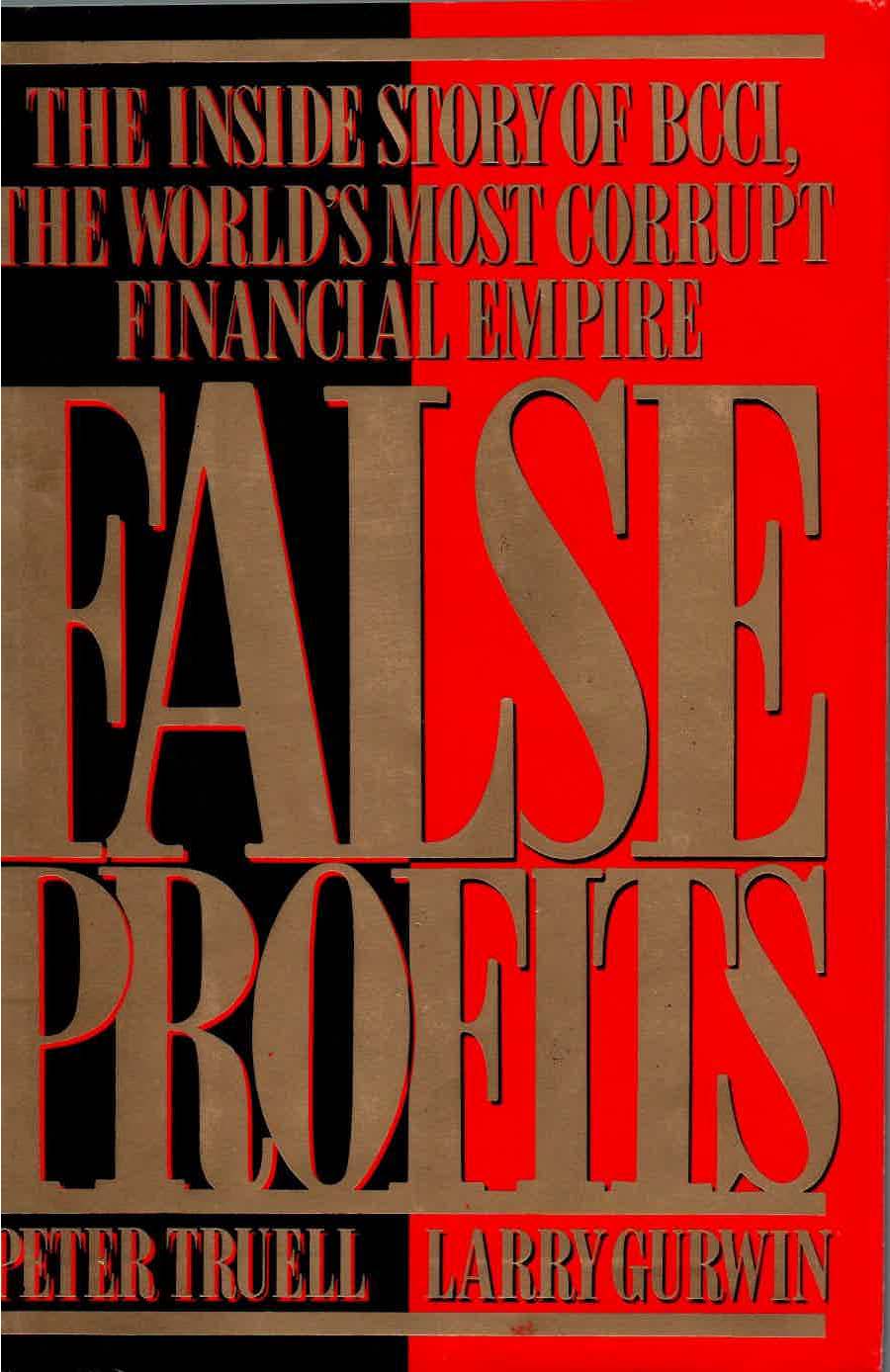 False Profits: The Inside Story of BCCI, the World’s Most Corrupt Financial Empire, published in December 1992. The Peter Truell, a staff reporter for Wall Street Journal, and Larry Gurwin, author of The Calvi Affair, which grew out of his coverage of the Banco Ambrosiano scandal, claim that the Bank of Credit and Commerce International (BCCI) was never truly a bank, and also that BCCI was, from the start, a monstrous fraud: behind a convincing facade, a shadowy group of Pakistani financiers and Arab sheikhs organized a criminal enterprise of unprecedented proportions. The two journalists build a narrative to show how BCCI used an array of schemes to steal billions of dollars and ultimately buy political influence in the United States and around the world, and BCCI's founder, Agha Hasan Abedi, robbing innocent depositors of their savings, assisting dictators in the looting of their countries' treasuries, and doing a brisk business with terrorists and drug lords.
False Profits: The Inside Story of BCCI, the World’s Most Corrupt Financial Empire, published in December 1992. The Peter Truell, a staff reporter for Wall Street Journal, and Larry Gurwin, author of The Calvi Affair, which grew out of his coverage of the Banco Ambrosiano scandal, claim that the Bank of Credit and Commerce International (BCCI) was never truly a bank, and also that BCCI was, from the start, a monstrous fraud: behind a convincing facade, a shadowy group of Pakistani financiers and Arab sheikhs organized a criminal enterprise of unprecedented proportions. The two journalists build a narrative to show how BCCI used an array of schemes to steal billions of dollars and ultimately buy political influence in the United States and around the world, and BCCI's founder, Agha Hasan Abedi, robbing innocent depositors of their savings, assisting dictators in the looting of their countries' treasuries, and doing a brisk business with terrorists and drug lords.
Considering the book was published back in 1992 in the height of the media coverage of BCCI’s abrupt shutdown by western central banks, it could not have taken into account subsequent events in the liquidation of BCCI. It is arguable that the book does not give an accurate explanation of one of the most influential financial intuitions in the Third World, and the rationale for depositors worldwide getting back over 90% of their monies with some countries deciding not to shutdown BCCI’s local operations.
 Dirty Money - BCCI - The Inside Story of the World's Sleaziest Bank published in 1992. The book is essentially based on the earlier book Bankrupt by London journalists, Nicholas Kochan and Robert Whittington, who teamed up with Mark Potts, Washington Post reporter in the USA. The authors do not appear to have direct knowledge of BCCI's global operations before the bank was abruptly shut down by western central banks in 1991. They do not explain why some countries decided not to shut down BCCI.
Dirty Money - BCCI - The Inside Story of the World's Sleaziest Bank published in 1992. The book is essentially based on the earlier book Bankrupt by London journalists, Nicholas Kochan and Robert Whittington, who teamed up with Mark Potts, Washington Post reporter in the USA. The authors do not appear to have direct knowledge of BCCI's global operations before the bank was abruptly shut down by western central banks in 1991. They do not explain why some countries decided not to shut down BCCI.
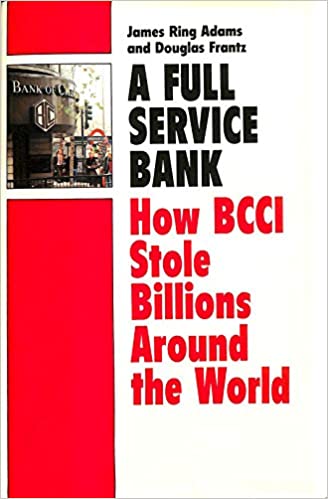 A Full Service Bank - How BCCI Stole Billions Around the World published in 1992. The authors did not have personal dealings with BCCI and relied on previously unpublished internal bank documents, the minutes of BCCI's executive meetings and extensive interviews in their effort to expose BCCI's alleged criminal schemes and precarious financial status. The authors do not point to anyschmes where the BCCI management was involved in misappropriating and stealing billions to enrich themselves. They do not also explain why BCCI was abruptly shut down in 1991 when the management were already in discussion with western central banks (the college of regulators) on restructuring plans that had the financial support of BCCI's majority shareholders, including the ruling family of Abu Dhabi, one of the richest royal families in the world.
A Full Service Bank - How BCCI Stole Billions Around the World published in 1992. The authors did not have personal dealings with BCCI and relied on previously unpublished internal bank documents, the minutes of BCCI's executive meetings and extensive interviews in their effort to expose BCCI's alleged criminal schemes and precarious financial status. The authors do not point to anyschmes where the BCCI management was involved in misappropriating and stealing billions to enrich themselves. They do not also explain why BCCI was abruptly shut down in 1991 when the management were already in discussion with western central banks (the college of regulators) on restructuring plans that had the financial support of BCCI's majority shareholders, including the ruling family of Abu Dhabi, one of the richest royal families in the world.
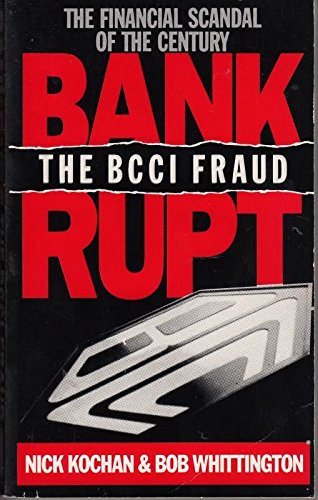 Bankrupt - The BCCI Fraud - The Financial Scandal of the Century published in November 1991, just few months after the abrupt closure of BCCI by western central banks on 5 July 1991. The authors, two London journalists, did not have personal dealings with BCCI on which they based their allegations. Their narrative has many misleading statements. These include referring to the abrupt closure of BCCI by western central banks as the financial scandal of the century, purportedly offering Muslim banking, and being a haven for terror gangs, arms dealers, drugs money launderers, international security services and sleazy dictators. The authors of Bankrupt failed to mention even a single instance where BCCI failed to honour its financial obligations.
Bankrupt - The BCCI Fraud - The Financial Scandal of the Century published in November 1991, just few months after the abrupt closure of BCCI by western central banks on 5 July 1991. The authors, two London journalists, did not have personal dealings with BCCI on which they based their allegations. Their narrative has many misleading statements. These include referring to the abrupt closure of BCCI by western central banks as the financial scandal of the century, purportedly offering Muslim banking, and being a haven for terror gangs, arms dealers, drugs money launderers, international security services and sleazy dictators. The authors of Bankrupt failed to mention even a single instance where BCCI failed to honour its financial obligations.
.jpg) GLOBAL MANAGEMENT PRINCIPLES published in 1989. The author, Dr Ronnie Lessem, who has written other books on management principles, ran the MBA course on global management principles and the undergraduate business foundation programme at the City University Business School in London, United Kingdom. There are many references to Bank of Credit and Commerce International (BCC) and the visionary founder, Mr Agha Hasan Abedi, with contributions from BCC by Mr John Hillbery, advisor of communications, and Mr Vilayet Hussain Abidi, UK Regional Manager, who was a close associate of Mr Abedi in the previous bank he founded, United Bank in Pakistan. Dr Leesem observes that while management personnel around the globe were grappling with primal, rational, and - less evidently - with developmental approaches to managing their enterprises, the real 'management' philosophy appeared on the horizon via the developing countries, and evolved in BCC. According to Dr Leesem, where BCC parted company with entrepreneurial management was in the degree of attention it placed on independence, as opposed to interdependence, particularly on the merger of energies resulting in what it calls 'joint personality'. Conventional management is beset by goal setting, strategy formulation, and by tangible measures of success. He concludes that these have an important part to play in real management, but a subordinate one to morality, purpose and the role of vision.
GLOBAL MANAGEMENT PRINCIPLES published in 1989. The author, Dr Ronnie Lessem, who has written other books on management principles, ran the MBA course on global management principles and the undergraduate business foundation programme at the City University Business School in London, United Kingdom. There are many references to Bank of Credit and Commerce International (BCC) and the visionary founder, Mr Agha Hasan Abedi, with contributions from BCC by Mr John Hillbery, advisor of communications, and Mr Vilayet Hussain Abidi, UK Regional Manager, who was a close associate of Mr Abedi in the previous bank he founded, United Bank in Pakistan. Dr Leesem observes that while management personnel around the globe were grappling with primal, rational, and - less evidently - with developmental approaches to managing their enterprises, the real 'management' philosophy appeared on the horizon via the developing countries, and evolved in BCC. According to Dr Leesem, where BCC parted company with entrepreneurial management was in the degree of attention it placed on independence, as opposed to interdependence, particularly on the merger of energies resulting in what it calls 'joint personality'. Conventional management is beset by goal setting, strategy formulation, and by tangible measures of success. He concludes that these have an important part to play in real management, but a subordinate one to morality, purpose and the role of vision.
.jpg) FAITH, HOPE, and the CORPORATION: Working on Outlook published in 1987 is just one of such books that reflect the outlook of Bank of Credit and Commerce International (BCCI) fashioned by the bank's President, Mr Agha Hasan Abedi, whose true discussions with employees as BCC family members, was on a deeper level and on developing people through work and bringing in the sense of possibility in them.
FAITH, HOPE, and the CORPORATION: Working on Outlook published in 1987 is just one of such books that reflect the outlook of Bank of Credit and Commerce International (BCCI) fashioned by the bank's President, Mr Agha Hasan Abedi, whose true discussions with employees as BCC family members, was on a deeper level and on developing people through work and bringing in the sense of possibility in them.
The Phenomenology of the Social World is a translation of Alfred Schutz's Der sinnhafte Aufbau der sozialen Welt, first published in Vienna by Julius Springer in 1932, and again, in unaltered form, by Springer-Verlag in 1960. The book is Schutz's major systematic work, setting forth his attempt to provide a phenomenological foundation for the basic concepts of the social sciences.
Alfred Schutz gradually gained recognition as one of the foremost philosophers of social science of the twentieth century. Recognition of his importance coincided with an awareness - extending far beyond the academic world - of the centrality of the problems which he discussed. Two of these problems are the role of objectivity versus subjectivity in the social sciences and the nature of human action.
The development of Schutz's later thought is to be found in his Collected Papers, published in three volumes by Martinus Nijhoff, The Hague, in 1962, 1964, and 1966 under the editorship of Maurice Natanson, Arvid Brodersen, and use Schutz, respectively. An English adaptation by Thomas Luckmann of Chapter 4 of the present work has previously appeared in the second volume of Collected Papers.
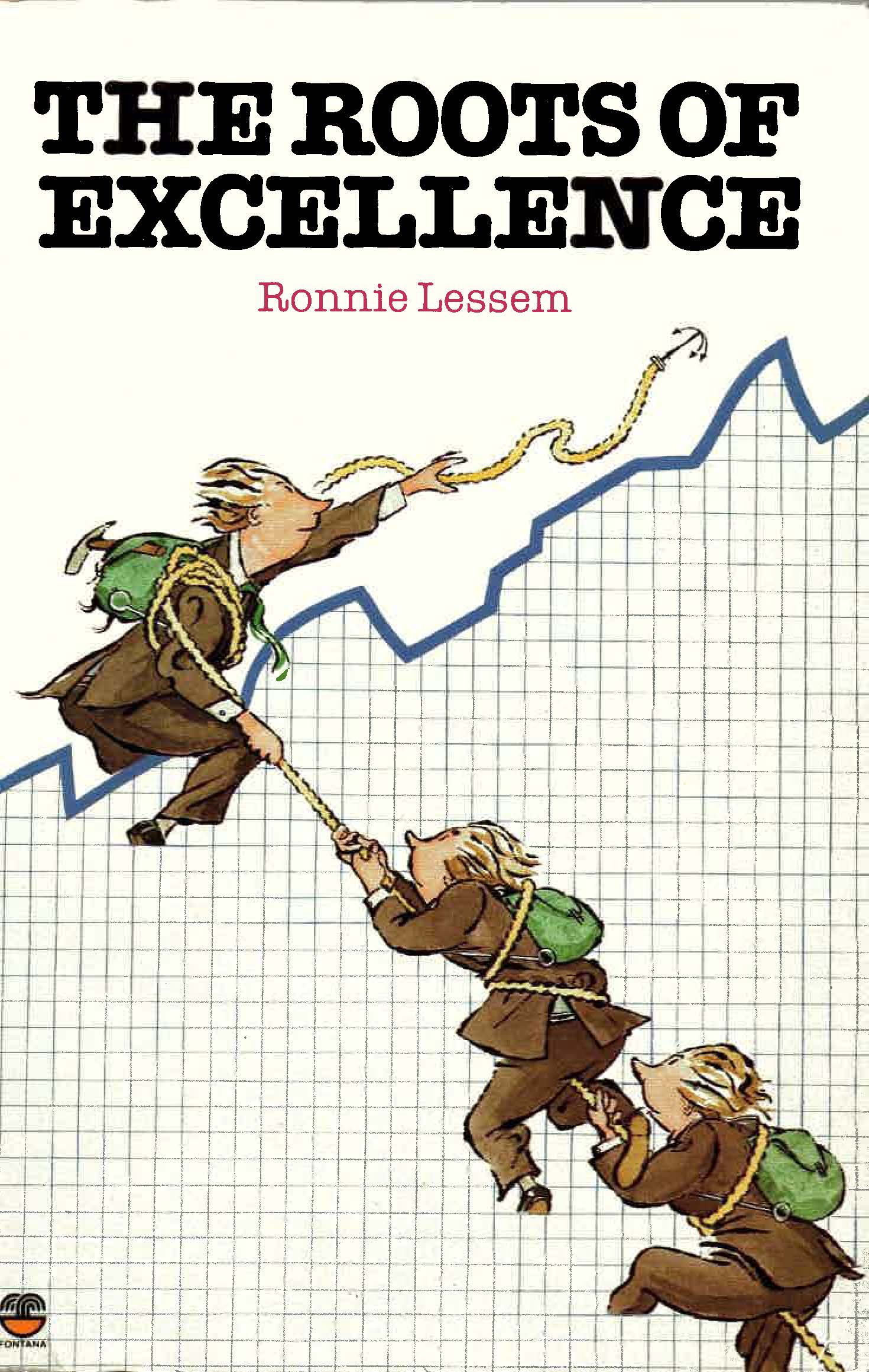 The Roots of Excellence (The Successful Manager) published in 1985. The author, Mr Ronnie Lessem was a graduate of Harvard Business School and at the time Director of the only university based programme in Business development in the UK. He has published a number of books, including GLOBAL MANAGEMENT PRINCIPLES (1989) also featured in this section. The Roots of Excellence was a breakthrough in business thinking and intended to be as relevant to the ambitious young entrepreneur as to the seasoned corporate leader. Mr Lessem points out that the corporate universe, unlike the more narrowly based company culture, represents a fusion between the whole individual and the total environment. The Bank of Credit and Commerce International (BCCI), then 12 years old and already reaching a state of maturity, was an example of this; 'Although is origin lie in Pakistan, its mission is universal and its operational headquarters are in London, UK'. Mr John Hillbery, advisor of communications at BCCI and closely associated with the President of the bank, told Mr Lessem that "the reason for their phenomenal growth was that they were in touch with the fundamental laws of nature, and were able to relate these to economics and finance ...". Mr Leesem refers to what BCCI called a 'spiritual profit’ and says that "To survive over the long term, individuals, corporations, and whole nations need to 'profit' spiritually as well as financially".
The Roots of Excellence (The Successful Manager) published in 1985. The author, Mr Ronnie Lessem was a graduate of Harvard Business School and at the time Director of the only university based programme in Business development in the UK. He has published a number of books, including GLOBAL MANAGEMENT PRINCIPLES (1989) also featured in this section. The Roots of Excellence was a breakthrough in business thinking and intended to be as relevant to the ambitious young entrepreneur as to the seasoned corporate leader. Mr Lessem points out that the corporate universe, unlike the more narrowly based company culture, represents a fusion between the whole individual and the total environment. The Bank of Credit and Commerce International (BCCI), then 12 years old and already reaching a state of maturity, was an example of this; 'Although is origin lie in Pakistan, its mission is universal and its operational headquarters are in London, UK'. Mr John Hillbery, advisor of communications at BCCI and closely associated with the President of the bank, told Mr Lessem that "the reason for their phenomenal growth was that they were in touch with the fundamental laws of nature, and were able to relate these to economics and finance ...". Mr Leesem refers to what BCCI called a 'spiritual profit’ and says that "To survive over the long term, individuals, corporations, and whole nations need to 'profit' spiritually as well as financially".
